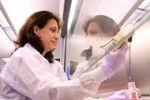More than five years of research and testing has provided a Texas A&M professor and a team of multi-disciplinary individuals a way to successfully destroy a wide range of cancer cells once thought to be immune to treatment.
Jim Sacchettini, professor of biochemistry and biophysics at Texas A&M, along with a team of researchers, has discovered a drug that makes cancer cells more susceptible to chemotherapy drugs by lowering the cancer cells resistance to treatment.
Drug resistance to chemotherapy is a huge problem, because generally speaking, individuals initially respond to cancer chemotherapies and they go into remission, Sacchettini said.
Though a patient may be in remission meaning there are little to no symptoms or signs of the presence of cancer cancer cells may still remain.
According to the National Cancer Institute, almost all of the near half-million deaths resulting from cancer annually in the U.S. can be attributed to the failure of chemotherapy because the tumor was either resistant at the outset or became resistant to standard drugs over time.
However, many patients relapse and their tumors re-grow because the remaining cancer cells after treatment were not killed.
These patients will require more aggressive chemotherapy, and most will eventually die because of their cancer, Sacchettini said.
The drug candidate RTI-79 is a chemical entity developed in Texas A&M labs that can reverse or eliminate resistance to chemotherapy in many human cancer cell lines, making chemotherapy a more effective form of cancer treatment.
Sacchettini is confident RTI-79 and similar compounds his team has developed will be beneficial to patients dealing with a wide range of cancers and cancer therapies.
Sacchettini said RTI-79 has demonstrated great success when tested on animal models and he has a design drafted for the first human clinical trial. He hopes to enroll his first patients in 2013.
The initial rounds of clinical human testing will focus on ovarian cancer patients.
Dr. Larry Myers, retired board-certified obstetrician gynecologist, watched some of his past patients battle various cancers.
Usually, this cancer is not discovered in its early stages because there are very few symptoms early on, Myers said, It can be devastating to the family because, often times, these cancers require more treatment due to a relapse after chemotherapy treatment.
Evan Bretos, freshman business major, experienced this type of devastation first hand.
Bretos father died after two years of battling pancreatic cancer. He went through chemotherapy and never went into remission.
Bretos said Sacchettinis discovery is groundbreaking, giving hope to families who had none.
This means cancer is no longer allowed to be a battle a patient is destined to lose, he said. Im grateful researchers havent given up on a cure and are still fighting as hard as patients to find a light at the end of the tunnel.
Treatment discovery
February 10, 2013

Donate to The Battalion
Your donation will support the student journalists of Texas A&M University - College Station. Your contribution will allow us to purchase equipment and cover our annual website hosting costs.



















